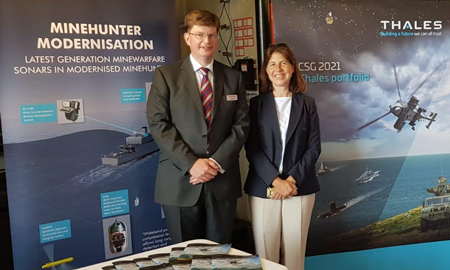An extremely powerful export proposition

We spoke with Elizabeth Baker, Head of Exports for Thales in the UK, about her role, how Carrier Strike Group’s (CSG) capabilities are helping Thales tap into more export opportunities, and what the Government and Royal Navy are doing to support Britain’s export potential.
Can you tell us a bit about your career journey up to this point?
After graduating with a degree in Natural Sciences, I eventually arrived at Thales via BT and Vodafone, QinetiQ, Airbus Defence and Space, and consultancy BWCS. I’ve always been genuinely interested in technology – not just what it can do, but how it works and the value it brings. Working for Thales means I can indulge my passion for learning about, promoting and sharing the company’s capabilities.
Can you give us a brief description of your role – and how it fits in with CSG?
I’m responsible for growing UK exports across all our business lines in Thales UK and all our markets internationally. It’s a sizeable chunk of business – about £400m last year – and it’s growing. We work alongside all of the Group’s Business Lines to help Export Capture Leads achieve the results which fuel this growth. Winning export deals in defence and space very often needs heavy-weight support from UK Government. Our small central team – Joe Barry, Joe Jones, and Vivian Njambi – help me make sure our colleagues in Government understand the potential Thales has to achieve export growth for the UK – and therefore the Government’s overall prosperity agenda. And to get them to intervene on our behalf with other governments and our customers in support of export campaigns. At the moment, we’re working with Government to make the most of the visits made by HMS Queen Elizabeth and her Carrier Strike Group to take some critical and meaningful steps to push our business forward.
There are seven UK capability areas behind most of our export success, and there’s a lot of overlap with what's on the Carrier Strike Group. In fact, you could say the CSG is the world’s largest mobile showroom for Thales UK’s maritime defence capabilities.
Can you tell us a bit more about the capabilities you export from the UK?
Anti-submarine warfare is an important UK capability – we export surface ship sonar and submarine sonar, as well as our optronics masts. There are our mine warfare capabilities, including conventional mine warfare sonars, ship refurbishments, command systems and our autonomous mine warfare capability – which is generating lots of interest from potential export nations right now. We provide and integrate the mission systems for various ships – our ability to do so from the UK is growing following our success with the Type 31 frigate – and our offer includes our naval communications solutions. Our electronic warfare (EW) capabilities provide information advantage for vessels by analysing the radio spectrum to give the earliest possible warning of approaching threats. We provide a range of weapons systems and fuzing, which are currently some of the stars of our portfolio – our missiles are very visible on CSG vessels, arming the Wildcat helicopter. We also offer a range of sensor systems, some of which are used for the CSG’s airborne surveillance capability. A key theme for the UK MOD at the moment is multi-domain integration, and Thales solutions on the Queen Elizabeth Class carrier pull together live sensor information from across defence to give a powerful global view of threats. Not present on CSG, but growing in importance for export, are our vehicle integration and optronics capabilities.
Are the UK Government and Royal Navy supportive when it comes to exporting?
I’ve noticed a big change in the five years since I’ve been at Thales. Exports are playing an increasingly central role in domestic and international policy with the Government often taking the initiative. That’s because strong exports support UK prosperity. This certainly helps me in my role. For example, I was recently on board HMS Defender (part of the CSG) in Odessa to represent Thales for the signing of a tri-partite memorandum of implementation between Ukraine, UK, and Babcock on HMS Defender. Thales is providing the mission systems fit for the vessels Babcock is offering the Ukrainian Navy. The event was great for Thales because the ship has our early warning (EW), our comms, and our Lightweight Multirole Missile (LMM) systems on board. Having these capabilities so visible, and clearly and obviously endorsed by the Royal Navy is, in itself, an extremely powerful export proposition.
So having multiple capabilities at the heart of CSG is helping the export process?
Absolutely. CSG events, like the one on board HMS Defender, show the power of bringing stakeholders together in one place. It’s extremely rare to get UK industry partners, the customer, and our Government in the same room at the same time, but it’s so valuable for sparking conversations in a hugely impressive environment. It’s one aspect of my job I really enjoy. It gives me the chance to host in a market where I’m the visitor. It’s like a little bit of the UK ,where you’re able to warmly welcome and host friends and colleagues from industry, from Government, and from allied nations we’re hoping to do business with.
Thales UK is at the leading edge of maritime defence capabilities. What’s behind the company's success in your view?
I think it’s a combination of our heritage and our long-standing expertise. Together they build trust, which is, ultimately, what the UK Government and our export customers put in us to deliver for them. I’d also say it’s and our ability to work closely with the MoD to identify capability gaps, to innovate, and to see what they need to achieve next.
Anything else you’d like to add?
There’s a full run-down on the capabilities we provide to the HMS Queen Elizabeth and the wider Carrier Strike Group here.
Main image UK MOD © Crown copyright 2021



